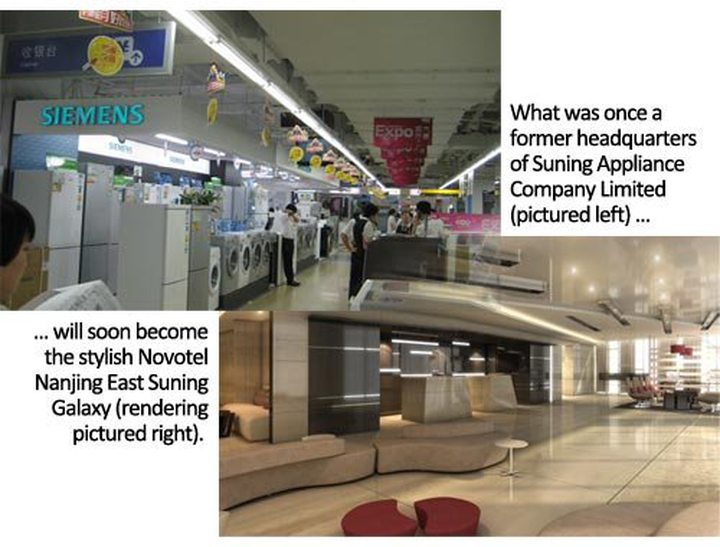Adaptive Reuse Re-Creates Unique Opportunities

Evolving trends and new construction methods have turned many buildings that were once highly functional into obsolete spaces, according to David Plank, associate principal at global design firm Kahler Slater.
Many of those buildings no longer serve their original purposes, but they make for great hotel conversions, he said. “Adaptive reuse in the hotel industry is pretty common …. and we see it in different aspects,” he said.
For example, Plank and his team are overseeing the conversion of the Hilton Garden Inn Milwaukee. The building was originally created as an office building for a life-insurance company in 1886. In 2011, executives of First Hospitality Group purchased the building to convert it into a hotel.
Additionally, in Nanjing, China, Suning Appliance Company Limited is converting one of its former headquarter offices into the Novotel Nanjing East Suning Galaxy, according to Duk Kim, principal at Gettys.
Challenges and opportunities
Jamie Hamilton, a designer at Kahler Slater, said a tremendous amount of opportunities and challenges present themselves in adaptive-reuse projects that just don’t arise when working on a standard hotel project.
The metal railings throughout the former office building in Milwaukee and high ceilings in what will be converted into Hilton Garden Inn guestrooms are features that are not found in new-build hotel construction these days, Hamilton said. “They just don’t make it like that anymore.”
Historic tiles on the first floor and an old bank vault also will remain as the building is converted into a hotel, Plank said.
Incorporating those unique features allows the designers to preserve the building’s previous life while still maintaining the brand’s identity.
Surprising opportunities also come up during the demolition phase of adaptive-reuse projects, Hamilton said. In the case of the Hilton Garden Inn Milwaukee, the team uncovered a skylight they were not expecting to find.
“In 1886, it was a great way to get natural light,” Plank said. “It’s really just reflective of the building design.”
However, not all demolition phases go as seamlessly as it did during the Hilton Garden Inn Milwaukee conversion.
The high ceilings in the Nanjing building proved to be a major challenge, Gettys’ Kim said.
“It almost never goes as smoothly as you’d like,” he said of the process.
Structural beams behind walls that were larger than anticipated or unexpected mechanical elements are just some of the factors that can throw a wrench into existing plans, Kim said.
More complicated issues can occur when harmful substances such as asbestos are found behind the walls, Plank said.
“You assume you’re going to run into some hurdles; you just don’t know what it’s going to be when you start,” he said.
It is important, Kim said, to keep in mind these challenges will undoubtedly pop up and one must remain adaptable throughout the process.
Comparing costs
The question still remains as to whether it is less expensive to open a property through an adaptive-reuse conversion or by building ground up.
“I think … it comes out as a wash,” Plank said. With adaptive reuse, “the exterior is already there, so there is a lot of material there to work with,” he said.
An adaptive-reuse hotel might not be as efficient as a new building, which can increase costs, but that gets offset with historic preservation tax credits, Plank said. “In the state of Wisconsin, it can be up to 25%.”
John Hardy, president and CEO of The John Hardy Group, has found the adaptive-reuse method of renovation can be an easy way to break into markets with high barriers to entry, such as New York.
“If you can buy (the building) economically enough and you can afford the cost of converting it into a hotel, it’s a good way to get into (the market),” he said.
When the hotel market was distressed during the recession, there wasn’t a lot of ground-up construction happening, Hardy said. People were having financial difficulties and investors found it would cost less to buy a building that may have been originally built for something else and convert it into a hotel.
Taking replacement costs into consideration is also important when deciding on an adaptive-reuse project, he said.
“It always boils down to the scope of what you’re doing,” Hardy said. “What can you identify clearly enough to evaluate it and assign a dollar value to it?”





